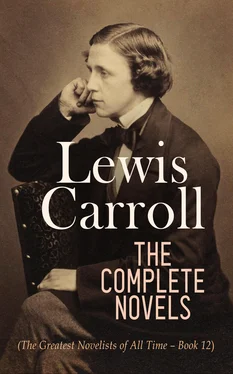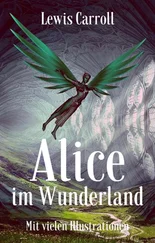If it be needful to apologize to any one for the new departure I have taken in this story—by introducing, along with what will, I hope, prove to be acceptable nonsense for children, some of the graver thoughts of human life—it must be to one who has learned the Art of keeping such thoughts wholly at a distance in hours of mirth and careless ease. To him such a mixture will seem, no doubt, ill-judged and repulsive. And that such an Art exists I do not dispute: with youth, good health, and sufficient money, it seems quite possible to lead, for years together, a life of unmixed gaiety—with the exception of one solemn fact, with which we are liable to be confronted at any moment, even in the midst of the most brilliant company or the most sparkling entertainment. A man may fix his own times for admitting serious thought, for attending public worship, for prayer, for reading the Bible: all such matters he can defer to that ‘convenient season,’ which is so apt never to occur at all: but he cannot defer, for one single moment, the necessity of attending to a message, which may come before he has finished reading this page, ‘ this night shall thy soul be required of thee .’
The ever-present sense of this grim possibility has been, in all ages, 1an incubus that men have striven to shake off. Few more interesting subjects of enquiry could be found, by a student of history, than the various weapons that have been used against this shadowy foe. Saddest of all must have been the thoughts of those who saw indeed an existence beyond the grave, but an existence far more terrible than annihilation—an existence as filmy, impalpable, all but invisible spectres, drifting about, through endless ages, in a world of shadows, with nothing to do, nothing to hope for, nothing to love! In the midst of the gay verses of that genial ‘bon vivant’ Horace, there stands one dreary word whose utter sadness goes to one’s heart. It is the word ‘ exilium ’ in the well-known passage
Omnes eodem cogimur, omnium
Versatur urna serius ocius
Sors exitura et nos in aeternum
Exilium impositura cymbae.
Yes, to him this present life—spite of all its weariness and all its sorrow—was the only life worth having: all else was ‘exile’! Does it not seem almost incredible that one, holding such a creed, should ever have smiled?
And many in this day, I fear, even though believing in an existence beyond the grave far more real than Horace ever dreamed of, yet regard it as a sort of ‘exile’ from all the joys of life, and so adopt Horace’s theory, and say ‘let us eat and drink, for to-morrow we die.’
We go to entertainments, such as the theatre—I say ‘we,’ for I also go to the play, whenever I get a chance of seeing a really good one and keep at arm’s length, if possible, the thought that we may not return alive. Yet how do you know—dear friend, whose patience has carried you through this garrulous preface—that it may not be your lot, when mirth is fastest and most furious, to feel the sharp pang, or the deadly faintness, which heralds the final crisis—to see, with vague wonder, anxious friends bending over you—to hear their troubled whispers—perhaps yourself to shape the question, with trembling lips, ‘Is it serious?,’ and to be told ‘Yes: the end is near’ (and oh, how different all Life will look when those words are said!)—how do you know, I say, that all this may not happen to you , this night?
And dare you, knowing this, say to yourself ‘Well, perhaps it is an immoral play: perhaps the situations are a little too “risky,” the dialogue a little too strong, the “business” a little too suggestive. I don’t say that conscience is quite easy: but the piece is so clever, I must see it this once! I’ll begin a stricter life to-morrow.’ To-morrow, and to-morrow, and to-morrow!
‘Who sins in hope, who, sinning, says,
“Sorrow for sin God’s judgement stays!”
Against God’s Spirit he lies; quite stops
Mercy with insult; dares, and drops,
Like a scorch’d fly, that spins in vain
Upon the axis of its pain,
Then takes its doom, to limp and crawl,
Blind and forgot, from fall to fall.’
Let me pause for a moment to say that I believe this thought, of the possibility of death—if calmly realised, and steadily faced—would be one of the best possible tests as to our going to any scene of amusement being right or wrong. If the thought of sudden death acquires, for you , a special horror when imagined as happening in a theatre , then be very sure the theatre is harmful for you , however harmless it may be for others; and that you are incurring a deadly peril in going. Be sure the safest rule is that we should not dare to live in any scene in which we dare not die .
But, once realise what the true object is in life—that it is not pleasure, not knowledge, not even fame itself, ‘that last infirmity of noble minds’—but that it is the development of character , the rising to a higher, nobler, purer standard, the building-up of the perfect Man —and then, so long as we feel that this is going on, and will (we trust) go on for evermore, death has for us no terror; it is not a shadow, but a light; not an end, but a beginning!
One other matter may perhaps seem to call for apology—that I should have treated with such entire want of sympathy the British passion for ‘Sport,’ which no doubt has been in by-gone days, and is still, in some forms of it, an excellent school for hardihood and for coolness in moments of danger. But I am not entirely without sympathy for genuine ‘Sport’: I can heartily admire the courage of the man who, with severe bodily toil, and at the risk of his life, hunts down some ‘man-eating’ tiger: and I can heartily sympathize with him when he exults in the glorious excitement of the chase and the hand-to-hand struggle with the monster brought to bay. But I can but look with deep wonder and sorrow on the hunter who, at his ease and in safety, can find pleasure in what involves, for some defenceless creature, wild terror and a death of agony: deeper, if the hunter be one who has pledged himself to preach to men the Religion of universal Love: deepest of all, if it be one of those ‘ tender and delicate ’ beings, whose very name serves as a symbol of Love—‘ thy love to me was wonderful, passing the love of women ’—whose mission here is surely to help and comfort all that are in pain or sorrow!
‘Farewell, farewell! but this I tell
To thee, thou Wedding-Guest!
He prayeth well, who loveth well
Both man and bird and beast.
He prayeth best, who loveth best
All things both great and small;
For the dear God who loveth us,
He made and loveth all.’
Chapter 1
Less Bread! More Taxes!
Table of Contents
—and then all the people cheered again, and one man, who was more excited than the rest, flung his hat high into the air, and shouted (as well as I could make out) ‘Who roar for the Sub-Warden?’ Everybody roared, but whether it was for the Sub-Warden, or not, did not clearly appear: some were shouting ‘Bread!’ and some ‘Taxes!,’ but no one seemed to know what it was they really wanted.
All this I saw from the open window of the Warden’s breakfast-saloon, looking across the shoulder of the Lord Chancellor, who had sprung to his feet the moment the shouting began, almost as if he had been expecting it, and had rushed to the window which commanded the best view of the market-place.
‘What can it all mean?’ he kept repeating to himself, as, with his hands clasped behind him, and his gown floating in the air, he paced rapidly up and down the room. ‘I never heard such shouting before—and at this time of the morning, too! And with such unanimity! Doesn’t it strike you as very remarkable?’
Читать дальше












